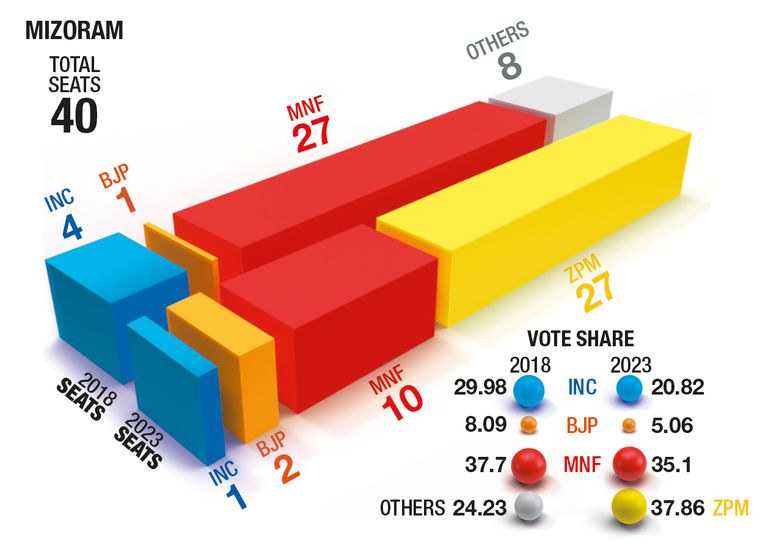IT TOOK LALDUHOMA three and a half decades of meticulous planning and execution to carve out an alternative path in Mizoram’s political landscape, breaking the duopoly of the Mizo National Front (MNF) and the Congress. The former IPS officer’s perseverance finally paid, as his party, the Zoram People’s Movement (ZPM), won 27 of 40 assembly seats in the state.
How appealing Lalduhoma’s vision of a new Mizoram to the people was evident in the results, especially in the urban areas―his party won all 10 seats in the state capital Aizawl and all four seats in Lunglei, the second-largest city. He also might have ended the political career of Zoramthanga, the three-time chief minister and an iconic figure in Mizo politics, who resigned as president of the MNF after its defeat. The MNF, however, rejected the resignation. Interestingly, Congress stalwart Lal Thanhawla, a five-time chief minister, retired from active politics after his defeat to Lalduhoma in the 2018 assembly election.
The turning of the tide was not unforeseen. When THE WEEK met Lalduhoma during the campaign, he was confident of getting a majority. The ZPM’s campaign starkly contrasted the conventional strategies of its rivals. It refrained from offering freebies and its foot soldiers worked systematically in the message-driven campaign.
Lalduhoma has had an eventful political career. In 1988, he became the first Lok Sabha member to be disqualified under the anti-defection law when he quit the Congress. After returning to Mizoram, he established several political outfits in his quest to provide an alternative to the Congress and the MNF. The Mizo National Union he founded in 1986 later merged with the Mizoram People’s Conference. He briefly aligned with the MNF before founding the Mizo National Front (Nationalist), and later rebranded it the Zoram Nationalist Party (ZNP). He won the assembly elections in 2003 and 2008 as ZNP candidate.
Ahead of officially registering the ZPM, Lalduhoma and his team contested the 2018 election as independent candidates and won eight seats. Upon the formation of ZPM in 2019, he was disqualified again because he was an independent legislator. He won the subsequent byelection.
Before joining the police, Lalduhoma had worked as principal assistant at the office of Ch. Chhunga, Mizoram’s first chief minister. He enrolled in an evening course for a bachelor’s degree and graduated from Guwahati University. He joined the IPS in 1977, and made headlines for the stringent action against the drug mafia in Goa. Later, he was appointed the security in-charge of prime minister Indira Gandhi.

Under Indira’s influence, Lalduhoma resigned from the police and joined the Congress. He was elected to Mizoram’s lone parliament seat and Indira made him her peace negotiator with Laldenga, the supremo of the Mizo National Front, which was then a militant organisation. Lalduhoma played an important role in realising the Mizoram Peace Accord, which was signed when Rajiv Gandhi was the prime minister.
While the MNF thrives on Mizo nationalism, the ZPM focuses more on corruption-free governance. It has published a sustainable development and reform policy aimed at ensuring good governance, fostering employment, improving health care and education, and implementing administrative and financial reforms. “The state exchequer is in a poor state, with warnings from the Reserve Bank. Our challenge lies in meeting the people’s expectations by delivering on our commitment to introduce a new governance system and supporting our farmers, the mainstay of our economy,” Lalduhoma said after the election results were declared.
The ZPM had fielded several young candidates like former international footballer Jeje Lalpekhlua, journalist and football organiser Lalnghinglova Hmar, and radio jockey Baryl Vanneihsangi. Jeje and Lalnghinglova defeated ministers. Two of the three women winners are also from the ZPM. No previous legislature in the state had more than one woman legislature.
Though not as outspoken as Zoramthanga on Mizo ethnic sentiments, Lalduhoma consistently takes a firm stand whenever the Zo community is under threat. When the ethnic strife in Manipur started spreading, he urged the Centre to impose President’s rule in the state and allow a separate administration for the hill area. After the election victory, he said it was not a conflict between communities, but a confrontation between the state government and tribal groups.
Also Read
- How BJP's planning made the difference in MP, Rajasthan and Chhattisgarh
- Assembly losses force Congress to rework its strategy for LS polls
- BJP next target in MP? 51 per cent vote share in 2024 LS polls
- 'Want to serve people till my last breath': Shivraj Singh Chouhan
- BJP might introduce aggressive governance in Rajasthan. Here's why
- How Revanth Reddy won a battle of personalities against KCR
The Manipur Kuki community places immense hope in Lalduhoma. “Mizoram is our new Jerusalem, our beacon of hope,” said Ginza Vualzong, spokesperson for the Indigenous Tribal Leaders Forum (ITLF). “As blood brothers, we expect the Mizos to stand with us during challenging times. We trust and have faith in Lalduhoma’s leadership and believe that he will continue to support us.”
The Congress’s primary narrative in the campaign was anti-hindutva. Rahul Gandhi accused both the MNF and the ZPM of providing the BJP backdoor entry to the state. The Congress won just one seat, its worst show ever.
Lalduhoma has declared that the ZPM will not take orders from Delhi, emphasising its commitment to functioning as a regional political entity with a national outlook. The MNF is a member of the BJP-led National Democratic Alliance.
The BJP won two seats, doubling its previous count thanks to the gains it made in the constituencies where the Mara ethnic minority holds influence. The ZPM is unlikely to align with the NDA or permit the two BJP legislators to sit on the treasury benches until the Lok Sabha elections next year. Things may change after that, given the state’s reliance on Central schemes and funds.


